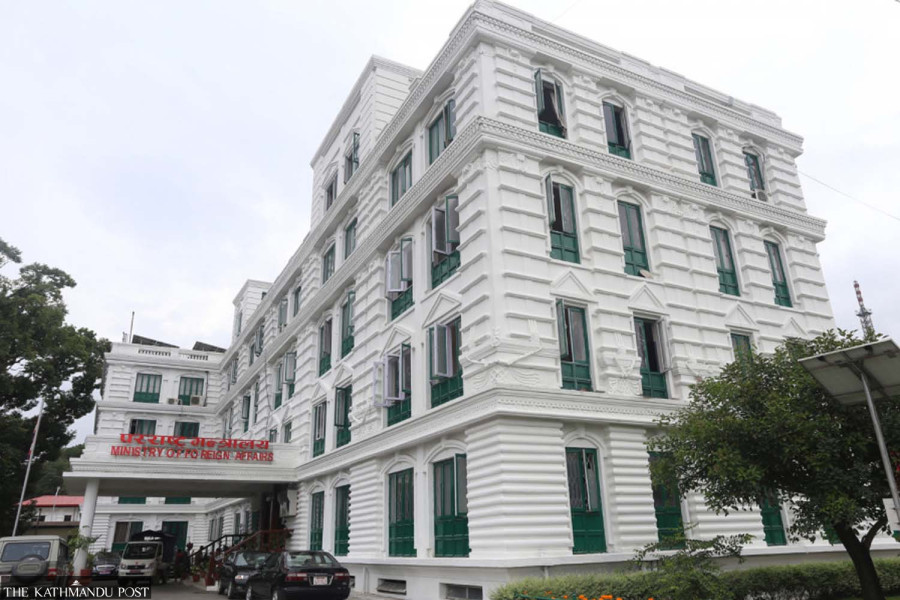National
Foreign ministry vacant amid great geopolitical churn
Coalition partner Congress considering NP Saud for the foreign minister job, but there’s no official decision yet.
Anil Giri
Nepal has not had a dedicated foreign minister since February 27 after the CPN-UML exited the Pushpa Kamal Dahal government.
Experts said not having a foreign minister for such a long time gives a message that the Nepal government is not serious about safeguarding national interest—at a time of fast-changing geo-political shifts around the globe.
For the past month and half, Prime Minister Dahal has himself been handling the foreign ministry that has been allocated to the Nepali Congress as part of a power-sharing deal. But the Congress has been unable to pick the nominees for four ministers, including the foreign minister, in its share.
Foreign ministry officials said the absence of a dedicated foreign minister has greatly affected their work.
“It is difficult to consult the prime minister on day-to-day matters. He has many other issues to deal with,” said a senior official at the ministry requesting anonymity.
Several internal issues in the foreign ministry need to be sorted out on a daily basis including coordination with other ministries, and the foreign secretary cannot sort them all out owing to protocol and other issues.
While the Congress is struggling to pick a nominee to head such a crucial ministry, the CPN (Maoist Center) has accused the largest party in Parliament of not taking the result of its absence from vital ministries seriously.
Party president Sher Bahadur Deuba is considering NP Saud for next foreign minister, but the decision is yet to be finalised, a leader close to Deuba said.
“I am surprised why they are taking so much time to fill such a crucial vacancy. It should be the government’s top priority,” former foreign minister Narayan Khadka said, adding, “I have heard that many of our friends are also not interested in becoming the foreign minister.”
According to Khadka, many party leaders think the foreign ministry has no direct connection with the public, nor does it have funds that can be spent in the minister's electoral constituency. Most importantly, the candidate needs to have a good command of the English language and sound understanding of national and international issues, and not many have these attributes.
“Given the rapid shifts in geopolitical dynamics, Nepal needs to adapt accordingly, hence it must have a qualified foreign minister,” said Khadka.
There have recently been several important diplomatic engagements including Nepal’s participation in the UN Human Rights Council in Geneva, the fifth conference of the least developed countries in Doha, and the Boao Forum in China. Also, the prime minister is scheduled to visit India soon, although the final date is yet to be fixed. According to officials, they also expect the prime minister to visit China after his India visit.
Earlier, as the UML was all set to quit the government, Prime Minister Dahal stopped former foreign minister Bimala Rai Paudyal for travelling to Geneva and instead sent former minister Govinda Bandi by appointing him as his human rights and peace adviser.
Although the prime minister was invited to the Boao Forum, he chose to skip the conference citing his busy schedule at home. He instructed the Nepali ambassador to China, Bishnu Pukar Shrestha, to attend.
Two back-to-back secretary-level talks were held with China in foreign minister’s absence.
Speaking on the desired qualification of the new foreign minister, senior leader of the Rastriya Prajatantra Party and former foreign minister Prakash Chandra Lohani, said the person should have a sound knowledge of international relations, geo-politics, geo-economy including good understanding of the economies of India and China and issues related to national security and national economy.
“The sad fact is everyone is looking for a resourceful ministry and so no one is interested in leading the foreign ministry,” said Lohani, adding, “I think foreign ministry carries a lot of weight, but parties have failed to understand its importance.”
“Big policy shifts have been taking place in the neighbourhood including in India and China. So in order to navigate the changing world order, Nepal needs a dedicated foreign minister who can chart out a clear strategy,” said Khadka, who is also a member of parliament from the ruling Congress party.
Some foreign policy experts and observers said that not having a dedicated foreign minister is bad enough, not having anyone at the helm is worse.
The Constitution also bars more than 25 members in the Council of Ministers, said Nishchal Nath Pandey, Director, Centre for South Asian Studies (CSAS), hindering the entry of ministers of state or assistant ministers as all coalition partners try to get full ministerial berths.
“India has two ministers of state for external affairs. But in Nepal, appointing ministers of state is not a priority. In the absence of a foreign minister, a younger minister of state or an assistant minister could have also filled the void. He/she would also be building personal rapport with the counterparts in the region and internationally, which would be useful for the nation,” Pandey added.
Due to the complex and challenging world order due to shifts in geo-politics, experts advise the new foreign ministry to think “out of the box”.
“Our foreign ministers have become the envoys of top party leaders to the Kathmandu-based ambassadors, mostly Indian and Chinese ambassadors. The new foreign minister should have a sound economic knowledge too and look beyond India and China to attract investment to Nepal, for example from the Gulf nations and Europe,” said former foreign minister Lohani.




 8.79°C Kathmandu
8.79°C Kathmandu















